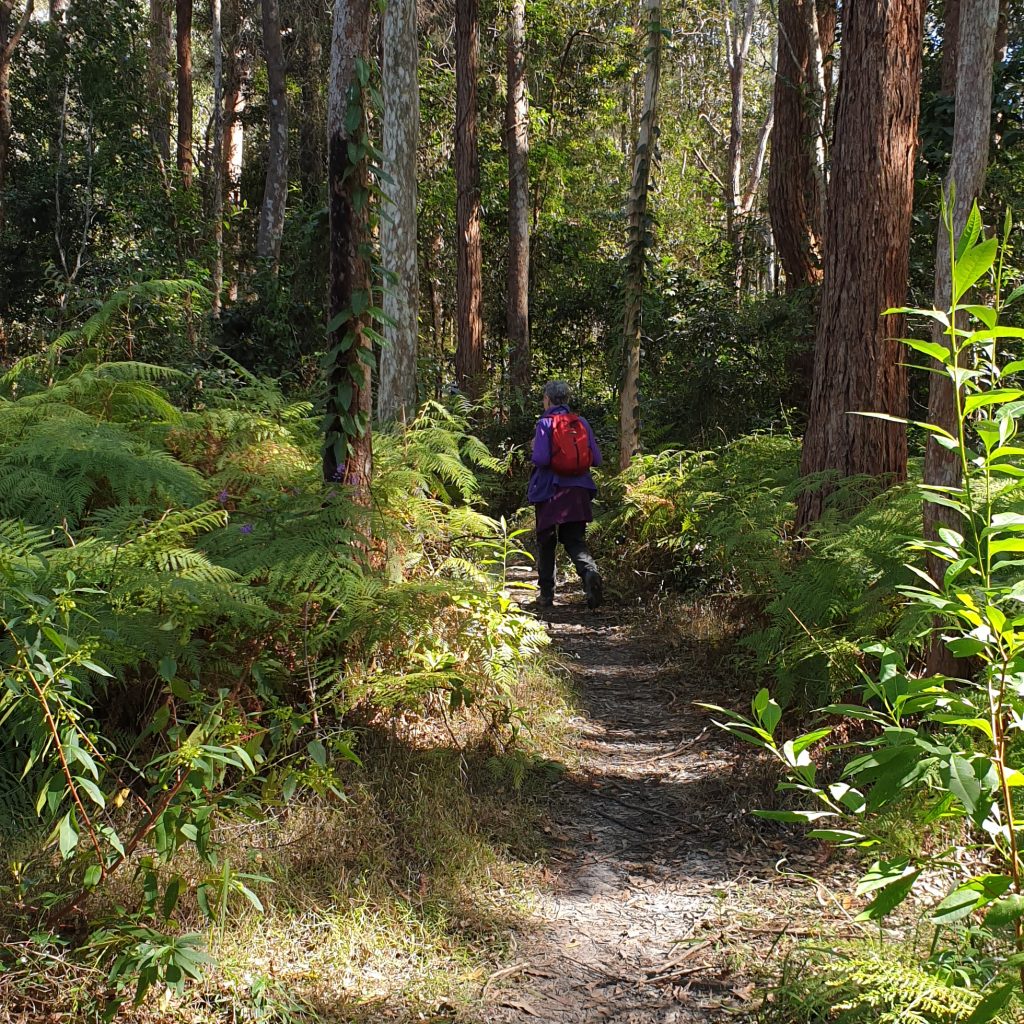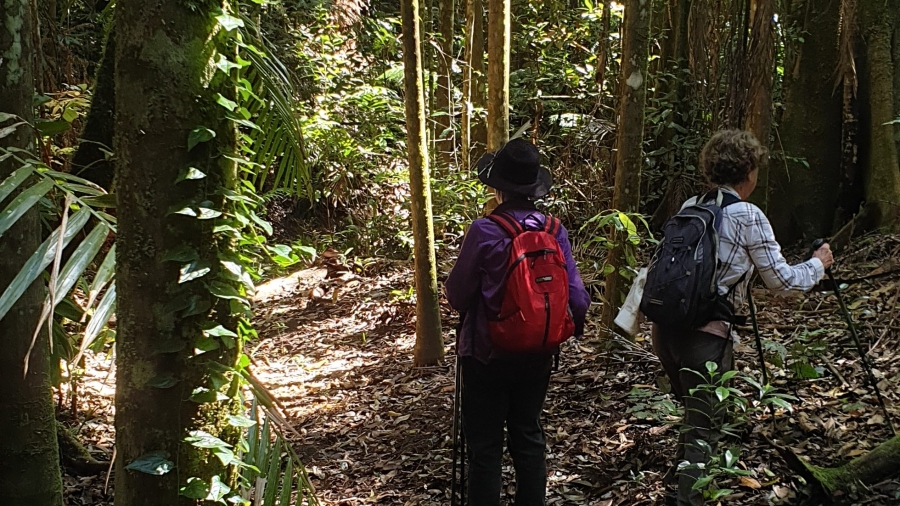What is Forest Bathing?
FB is a nature connection practice inspired by the Japanese where it is called Shinrin Yoku. The Western Culture has also taken the practice and uses the terms forest therapy or nature therapy.
It’s not about getting wet.
The idea is to fully immerse yourself in nature and to bathe your senses.
Put simply it is about taking a slow mindful walk in nature, breathing in the forest air, sitting and observing, and developing an emotional connection to the forest.
It is different from hiking – where the pace is faster and you miss a lot of what is going on around you. It is also different from a naturist walk – where you might be identifying and naming particular species of fauna or flora.

A forest bathing or nature therapy walk covers less than a kilometre over a 3 hour time frame. Its aim is to help people slow down and take a break from the stresses of daily life, and to appreciate things that can only be noticed when moving slowly. Some people describe it like doing meditation or mindfulness in nature.
How do you do it? What do you actually do?
So my role as a Guide is to open the door for participants, knowing that the forest will provide exactly the kind of medicine they need. I do this by issuing a series of invitations, that participants can choose to take up if they feel comfortable. We always start with a guided meditation bringing people’s awareness to all their senses, and finish with a tea ceremony ideally using plants harvested along the trail. What happens in between, depends on what kind of environment we are in and what else is might be happening around us.
After each invitation, we come together as a group to share our experience, as much as we want to reveal, about what we are noticing within the environment or within ourselves.
We have a saying that the forest is the therapist, the guide just opens the door. Basically we make it easy for you to drop in to a relaxing and mindful space.
What evidence is there to say that it works?
The Japanese have been studying the effects of forest bathing since the 1980’s when it became a public health initiative, in response to the number of people that were basically working themselves to death. It was based on the principal that spending time in the forest was beneficial to health. To prove it, the Japanese ran a number of studies to evaluate the effects of walking in urban environments compared to the forest.
What they discovered was an antimicrobial organic compound called phytonicides that are given off by evergreen trees such as pines and eucalypts. When you go on a relaxed forest therapy walk breathing in these phytonicides, your blood pressure drops, your cortisol level (or stress hormone) reduces, and heart rate variablilty improves. Phytoncides, are natural immune boosters which increase the natural kill cells in our body, which have been associated with fighting cancer.
Other research has shown that being in nature:
- Reduces depression and anxiety
- Makes us more calm, focused and creative
- Improves our mood and sleeping habits
- Helps us to recover quicker after surgery or illness
In Japan and Korea, doctors now offer ‘green prescriptions’ for their patients to go walking in a Certified Forest Therapy trail. Other countries such as America are also working towards this in their health system. It’s starting to be talked about slowly in Australia but we are a long way off adopting this as a ‘go to’ prescription for mental health.
Why do we need forest bathing?
1. It’s part of our true nature
Our species evolved in forests. We spent the first several million years of our existence in them. Then we invented cities. Suddenly, while our genes are still optimized for the forest, our bodies live in the busy, stressful conditions of modern civilization.
Richard Louv has also used the term nature deficit disorder to describe the problem of children spending much less time in nature based outdoor activity, which is having a detrimental impact on their development.
2. Our own health and wellbeing
We have rates of mental health problems that are out of control. Over 50% of people are stressed at work. And 1 in 5 of us will go on to experience a mental illness. Many physical illnesses and disease can also be linked to stress as an underlying cause.
There is lots of scientific evidence to show that being in nature lowers stress levels and boosts immunity to fight infection and disease.
3. To address the Global climate problem
Humans have become so separate from nature that there has been little regard to how we treat the earth. I believe that if we are more closely connected to the natural world, we are more likely to want to care for and protect it.
So rebuilding our intimate connection to the forest again, will ultimately lead to the healing of the planet and of course, our own health too.
Why go with a guide? Why not on your own?
Some people find it really hard to slow down and they need someone to show them the way. Just like yoga, meditation or working out, Shinrin Yoku is a practice, that a Guide can help you develop and integrate into your everyday experience.
I guess one way of looking at it is… you could ask your partner for a massage, but if you want a really good massage from a trained, experienced person, then you go to a massage therapist.
In saying that, I am all for, more people getting out in nature more often. If people would like some ideas on how to incorporate nature connection in their life every day, I encourage them to get in touch. Subscribe to my newsletter and I will send you a free e-book of Nature Therapy invitations you can use on your own private forest bathing experience.
Where can I try it?
From time to time I offer public Nature Therapy walks or you can book a private walk with a group of friends, work colleagues or an intimate experience with your partner. I also offer forest bathing as a Corporate Wellbeing experience for small teams who want to promote health and wellbeing in their workplace.
Get out in nature. It not only feels intuitively good for you. But science says it’s so.

